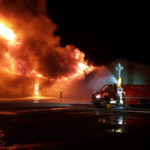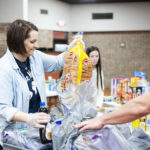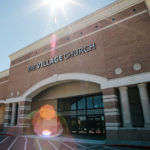Ask Pastor Bob Ray what it takes to serve the same country church in a tiny unincorporated Central Texas community for five and a half decades, and he has a ready answer.
“First, you have to live a long time.”
Ray became pastor of Fairy Baptist Church, 10 miles south of Hico, in August 1965. It’s the only pastorate he has held. And Ray, who will turn 80 in February, has no intention of retiring anytime soon.
“My passion is pastoring,” he said. “I love to preach, but I love to pastor even more.”
More than four decades as a bivocational pastor
For more than 40 years, Ray served the church bivocationally, working three and a half decades in manufacturing and six years on the Baptist General Convention of Texas staff.
Each weekend, he and his wife Rosalind—and, over time, their three sons Bob, Richard and Matt—made the 80-mile trek from their home in Burleson to the small community in Hamilton County.
“When I started, the term ‘bivocational’ didn’t even exist. I was considered the ‘part-time preacher’—and no pastor wants to be considered part-time,” he said. “Some people even told me, ‘Quit fooling around and get yourself a big church.’”
Two consultants at the Southern Baptist Convention’s Home Mission Board—Dale Holloway, who pioneered bivocational ministry, and Gary Farley, who worked with rural church ministry—helped shape Ray’s pastoral philosophy and solidify his commitment to serve a small rural church for the long haul.

The Rays were among 10 couples who formed the Texas Baptist Bivocational and Smaller Membership Ministers and Spouses Association. When Ray retired from secular employment after 23 years with Halliburton and another 12 years with related manufacturing companies, he directed Texas Baptists’ bivocational and smaller membership church work for six years.
Sign up for our weekly edition and get all our headlines in your inbox on Thursdays
In addition to Holloway and Farley, Ray also credits Lee Roy Williamson, who served 25 years as director of missions for Tri-Rivers Baptist Area, as a “mentor deluxe.”
“He always gave good advice, loved on me and loved on my family,” Ray said.
When Ray graduated from Southwestern Baptist Theological Seminary, most members of Fairy Baptist Church expected him to leave.
“Eventually, the church realized we were going to stay. They had never had a pastor stay beyond about four years before,” Ray said.
Once the church recognized his intention to remain, they ceased viewing him as the preacher who drove to their town each weekend and began seeing him as their pastor, he noted.
First learn the people and love the people
From the beginning of his time at the church, however, the seeds for a long-term pastorate were sown by a weekly gift from the congregation.
“One of the big blessings the church gave us was that every church member was on a list to feed the pastor and his family one Sunday” on a rotating basis, he said. “We got to know the people, because every Sunday we were in somebody’s home. That made all the difference in the world.”
Before long, members volunteered to care for the Rays’ sons on Sunday afternoon, allowing the couple an opportunity to make hospital visits and other pastoral calls.
Although he is quick to note the saying did not originate with him, Ray summarized his philosophy of pastoral ministry simply: “You have to learn the people and love the people before you can lead the people.”
Ray readily acknowledges he and his wife had frank conversations on multiple occasions, wondering if they were doing the right thing staying at Fairy Baptist Church.
“We asked, ‘Are we holding the church back?’ And we wondered if we were doing right by our family. There were times when our three kids were the only ones their age at the church. But we prayed our way through it,” he said.
“God has been good to us, and we’re so thankful. Our kids grew up loving the Lord and loving the church. Our grandchildren are all in church. I baptized every one of them—and one great-grandchild.”
‘Where God wanted us’
In 2001, the Rays purchased 100 acres in Fairy and began remodeling the farmhouse located on the property. When they moved to the community in 2007, he was the first pastor to live in Fairy in the church’s history.
“We knew it was where God wanted us,” he said.
Today, the Rays raise Boer goats on their land—about half of it hillside brush. And they relish the opportunity to live on the field and be a part of the community seven days a week.
In 55 years, the couple have seen the church and community change significantly. Other than one mechanic, everyone in the church made a living farming and ranching when Ray arrived as pastor.
Now, some “do farming and ranching on the side,” but they make their living working as teachers, nurses and business people in surrounding towns or working online, Ray noted.
Also, a significant number in the church and the community are retirees, including some people who moved to rural Hamilton County from metropolitan areas.

During the years when the community was making that transition, Ray said, he essentially served as an interpreter, helping farmers and ranchers who grew up in the area understand newcomers who moved there and vice versa.
“The church moves a lot quicker now when it comes to making decisions. They’re not going to go into debt, but they’re not afraid to spend money when they want to do something,” he said.
Other changes the church has made in the last 55 years have stories attached to them. For example, the church sanctuary lacks an indoor baptistery since baptisms used to be performed in stock tanks.
“That came to a halt one Sunday morning when I got a call from a church member. We were supposed to use his stock tank, but he said there was a problem. He said there was a dead cow in the middle of the tank,” Ray said.
Since then, the pastor has performed most baptisms either in a watering trough or in a swimming pool.
Emphasis on missions
One of the church’s strengths always has been its emphasis on missions, Ray noted. About one-third of its undesignated receipts are earmarked for missions—associational, state, national and international.

Another reflection of the church’s missions-mindedness is its willingness to invest in reaching children and youth—many of whom will move on to pursue their education and careers away from Fairy.
The church also has been willing to innovate. When COVID-19 hit, the congregation gathered for drive-in worship services on the church property. Seven people joined the church during the pandemic, Ray noted.
Only 14 people live within the immediate confines of Fairy, but Fairy Baptist Church consistently draws more than 50 worshippers, drawing from Hico and other surrounding communities.
“There was a time when each church had its field, and everybody knew it. There was an understanding that you stayed within a certain area around your church,” Ray said. “Gary Farley was the first person I heard say that rural people will drive as far to get to church as they’ll drive to get to Walmart.
“And the closest Walmart is 35 miles away from here.”
Read more articles like this in CommonCall magazine. CommonCall explores issues important to Christians and features inspiring stories about disciples of Jesus living out their faith. An annual subscription is only $24. To subscribe to CommonCall, click here.














We seek to connect God’s story and God’s people around the world. To learn more about God’s story, click here.
Send comments and feedback to Eric Black, our editor. For comments to be published, please specify “letter to the editor.” Maximum length for publication is 300 words.